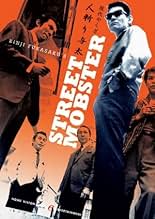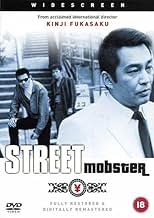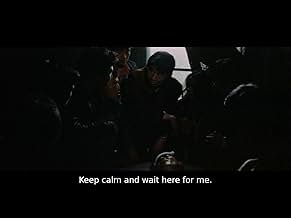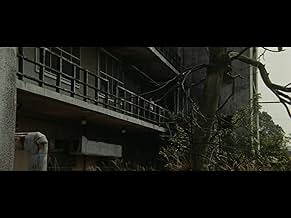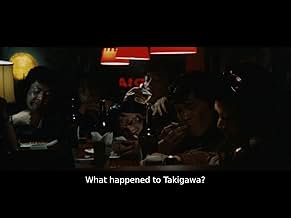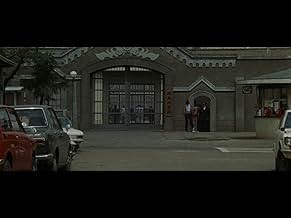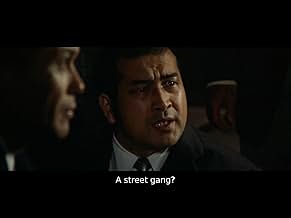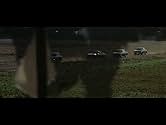VALUTAZIONE IMDb
7,1/10
1331
LA TUA VALUTAZIONE
Aggiungi una trama nella tua linguaA yakuza, who has an untamed rage and lack of respect for authority, finds himself leading the remnants of the gang he once belonged to in order to secure an area of their own.A yakuza, who has an untamed rage and lack of respect for authority, finds himself leading the remnants of the gang he once belonged to in order to secure an area of their own.A yakuza, who has an untamed rage and lack of respect for authority, finds himself leading the remnants of the gang he once belonged to in order to secure an area of their own.
- Regia
- Sceneggiatura
- Star
Recensioni in evidenza
This movie is the life story of a punk named Isamu--with the bulk of it following his insane path following his release from prison. While the idea of a mobster being a sociopath is no surprise, Isamu is peculiar even among the yakuza. This is because he also has an insane need for excitement and is incredibly self-destructive and angry--so much so that you know he cannot continue his path for long. After all, taking on the yakuza (sort of like the Japanese mafia) nearly single-handedly is just plain nuts! Yet, this crazed punk assembles a very small gang and attempts to do just that!
"Street Mobster" is one of the most violent and nihilistic Japanese films I have ever seen. Its violence is vicious, uncaring and filled with pure rage. And, as a portrait of a thug, it IS effective and realistic. But, with graphic rapes, stabbing after stabbing after stabbing, it makes you wonder who the audience would be for this blood-fest. Plus, after raping one woman, the lady then has a twisted love-hate relationship with him that is just plain unsavory. Not a movie I enjoyed and one I am loathe to recommend because it's so nasty, but it IS unflinching and pulls no punches.
"Street Mobster" is one of the most violent and nihilistic Japanese films I have ever seen. Its violence is vicious, uncaring and filled with pure rage. And, as a portrait of a thug, it IS effective and realistic. But, with graphic rapes, stabbing after stabbing after stabbing, it makes you wonder who the audience would be for this blood-fest. Plus, after raping one woman, the lady then has a twisted love-hate relationship with him that is just plain unsavory. Not a movie I enjoyed and one I am loathe to recommend because it's so nasty, but it IS unflinching and pulls no punches.
Street Mobster is among my favorite yakuza films, and from one of my favorite Japanese directors. This is a great, less-popular Fukasaku film, and it really deserves more attention.
Okita is our "hero", if you can call him that. He's hot-heated, violent, and unapologetic. I can't think of a time in the film where he really shows restraint. He's just such an over-the-top, punk rockin' character who doesn't care about rival gangs or other thugs; he wants to do what he wants, when he wants to. And that's definitely the driving force behind the film, it's explosive nature. It's so unglamorous and filthy at times, and yet you have this sense of a man living his life, maybe not to it's full potential, but having a hell of a lot of fun doing what he's doing. And maybe he's not even enjoying it, everything else is just too conformist for him. He simply doesn't back down. So he really is a hero, a hero to the downtrodden. A counterculture icon, a raging machine.
With it's boisterous protagonist comes a slew of background characters who are really just there to make Okita the centerpiece. Aside from the prostitute that he raped years earlier and now forms a bond with (Whose name I can't even remember!) there are few other noteworthy characters. And that's really okay. When they speak, they speak to get Okita's reaction. If you don't like Okita, then you're probably not going to like the film. Me, I enjoyed this rebellious, non-conformist gangster, yelling and picking fights. It was just so over-the-top and the director clearly embraced the punk style that was emerging at the time of this film's release.
Speaking of release time, I just watched the film again a few minutes ago, and I still can't believe it was made in 1972. I'm sure you've heard it before, but it's way ahead of it's time. It looks 90s-ish to me. The shaky-cam and jump cuts stand out most as then-foreign techniques. Of course, now they've become the norm in films.
So that's my short review. I don't feel that there's a whole lot more ground to cover as Okita is really the main attraction. So if you're looking to kill 87 minutes and consider yourself a fan of exciting cinema, look no further than Street Mobster.
Okita is our "hero", if you can call him that. He's hot-heated, violent, and unapologetic. I can't think of a time in the film where he really shows restraint. He's just such an over-the-top, punk rockin' character who doesn't care about rival gangs or other thugs; he wants to do what he wants, when he wants to. And that's definitely the driving force behind the film, it's explosive nature. It's so unglamorous and filthy at times, and yet you have this sense of a man living his life, maybe not to it's full potential, but having a hell of a lot of fun doing what he's doing. And maybe he's not even enjoying it, everything else is just too conformist for him. He simply doesn't back down. So he really is a hero, a hero to the downtrodden. A counterculture icon, a raging machine.
With it's boisterous protagonist comes a slew of background characters who are really just there to make Okita the centerpiece. Aside from the prostitute that he raped years earlier and now forms a bond with (Whose name I can't even remember!) there are few other noteworthy characters. And that's really okay. When they speak, they speak to get Okita's reaction. If you don't like Okita, then you're probably not going to like the film. Me, I enjoyed this rebellious, non-conformist gangster, yelling and picking fights. It was just so over-the-top and the director clearly embraced the punk style that was emerging at the time of this film's release.
Speaking of release time, I just watched the film again a few minutes ago, and I still can't believe it was made in 1972. I'm sure you've heard it before, but it's way ahead of it's time. It looks 90s-ish to me. The shaky-cam and jump cuts stand out most as then-foreign techniques. Of course, now they've become the norm in films.
So that's my short review. I don't feel that there's a whole lot more ground to cover as Okita is really the main attraction. So if you're looking to kill 87 minutes and consider yourself a fan of exciting cinema, look no further than Street Mobster.
Street Mobster is a violent Japanese gangster movie by prolific director Fukasaku Kinji who would later on direct influential genre masterpieces such as Battles Without Honor and Humanity, Graveyard of Honor and Yakuza Graveyard. Western audiences know him as the director of dystopian action thriller Battle Royale which was the last movie he was able to complete.
The story of this movie is rather simple. It follows the life of a violent gangster who attacks the members of an inflluential clan who try to extort money from him and associates. He spends some time in prison but soon forms a new gang that is particularly violent. He ultimately gets injured and is temporarily forced to join a bigger family for protection. When another and even bigger family from Osaka tries to increase its influence in Kawasaki, the film's violent antagonist decides to disrespect common conventions and brutally disrespects the different gangster families. The three involved families come to the only reasonable conclusion: they must cooperate to eliminate the antagonist and his associates to preserve peace.
The most interesting element about Street Mobster is its violent, nihilistic and egoistic antagonist who isn't interested in compromises, peace or truces. He desires to become the biggest gangster boss in the country by any means necessary. While this character is extremely dislikeable, he is brutally consequent and honest in his actions and therefore more complex and profound than one might think at first contact. The movie impresses with numerous violent scenes supported by dynamic camera work that have aged rather well and can still be considered offensive nowadays. The film has frantic pace and entertains from start to finish.
On the negative side, there are very few characters to sympathize or empathize with. As opposed to Western gangster movies, even the victims and outsiders in organized crime come off as careless and despicable. The story is also extremely thin and quite predictable. The action scenes are quite intense but also rather repetitive. The movie impresses at first contact but lacks creativity, depth and diversity.
To conclude, you should watch Street Mobster if you are looking for a particularly brutal, entertaining and fast gangster movie that has stood the test of time. This film certainly entertains while it last but doesn't leave any deeper impression due to its thin story line. Street Mobster is a feast for genre fans but can't compete with Fukasaku Kinji's later works.
The story of this movie is rather simple. It follows the life of a violent gangster who attacks the members of an inflluential clan who try to extort money from him and associates. He spends some time in prison but soon forms a new gang that is particularly violent. He ultimately gets injured and is temporarily forced to join a bigger family for protection. When another and even bigger family from Osaka tries to increase its influence in Kawasaki, the film's violent antagonist decides to disrespect common conventions and brutally disrespects the different gangster families. The three involved families come to the only reasonable conclusion: they must cooperate to eliminate the antagonist and his associates to preserve peace.
The most interesting element about Street Mobster is its violent, nihilistic and egoistic antagonist who isn't interested in compromises, peace or truces. He desires to become the biggest gangster boss in the country by any means necessary. While this character is extremely dislikeable, he is brutally consequent and honest in his actions and therefore more complex and profound than one might think at first contact. The movie impresses with numerous violent scenes supported by dynamic camera work that have aged rather well and can still be considered offensive nowadays. The film has frantic pace and entertains from start to finish.
On the negative side, there are very few characters to sympathize or empathize with. As opposed to Western gangster movies, even the victims and outsiders in organized crime come off as careless and despicable. The story is also extremely thin and quite predictable. The action scenes are quite intense but also rather repetitive. The movie impresses at first contact but lacks creativity, depth and diversity.
To conclude, you should watch Street Mobster if you are looking for a particularly brutal, entertaining and fast gangster movie that has stood the test of time. This film certainly entertains while it last but doesn't leave any deeper impression due to its thin story line. Street Mobster is a feast for genre fans but can't compete with Fukasaku Kinji's later works.
Outlaw Killer or as it says in the film, Street Mobster, is a bloody violent look into a totally self-destructive renegade street punk that can't ever seem to back down from a fight, no matter how suicidal. Truly a hilarious, incredibly charismatic character. So funny.
The film follows him as he talks about his youth, his incarceraton and picks up with him creating a new gang. Parts are a bit too melodramatic, especially at the end, but the characters are well-crafted and the action sequences are frenetic and fun.
A unique view of yakuza and street punk life in Japan in the early '70s from crazy-guy Fukasaku, the man behind Tora! Tora! Tora! and the fantastic Battle Royale.
The film follows him as he talks about his youth, his incarceraton and picks up with him creating a new gang. Parts are a bit too melodramatic, especially at the end, but the characters are well-crafted and the action sequences are frenetic and fun.
A unique view of yakuza and street punk life in Japan in the early '70s from crazy-guy Fukasaku, the man behind Tora! Tora! Tora! and the fantastic Battle Royale.
This has a similar look to some of the early 70s New York gangster and Blaxploitation flicks, only with an eye for the big moody shadows that wouldn't be out of place in a Carol Reed movie. The acting is pretty good, even when the hero is tired and emotional, and the few characters that are fleshed out are never let down by the script. It's easy to see how Riki Takeuchi and Takashi Miike misspent their youth. I wouldn't go so far as to call it a classic, but it compares very favourably with the the best of its era.
The twang of the jaws harp and the jarring off-key harmonica are a nod in the direction of Ennio Morricone. The hyper realism (and melodrama)is very much of its day. Think of Larry Cohen, Sergio Leone, Roman Polanski, Sergio Corbucci, Sam Fuller, Sam Peckinpah, Don Siegel, and their ilk in the 60s and 70s, and accept that film has always been an international conspiracy by artists with attitude. Audiences may be isolated by language, but filmmakers are interested in the visual aspects, and they don't need translation, only an understanding of technique. Kurosawa and Mishima opened up Japanese cinema to the world, and Japanese film makers responded by drawing influences from the wider world.
This movie takes the technical influences and extrapolates them into the boom years of the Japanese economy. Where's there's money, there's organised crime. The casual unaffiliated street punk was a dying breed in the 70s. It's noticeable that the "punks" don't wear suits. They look more like refugees from the beatnik era, and the jazzy sections of the score (that accompany their drunken good times) seem to be saying that their day is done. Kinji Fukasaku is as deserving of credit as any of the aforementioned masters of pulp. His eye is true, and whenever he has a decent script, he makes a good or a great movie, usually on a tight budget. Who could ask for more?
The twang of the jaws harp and the jarring off-key harmonica are a nod in the direction of Ennio Morricone. The hyper realism (and melodrama)is very much of its day. Think of Larry Cohen, Sergio Leone, Roman Polanski, Sergio Corbucci, Sam Fuller, Sam Peckinpah, Don Siegel, and their ilk in the 60s and 70s, and accept that film has always been an international conspiracy by artists with attitude. Audiences may be isolated by language, but filmmakers are interested in the visual aspects, and they don't need translation, only an understanding of technique. Kurosawa and Mishima opened up Japanese cinema to the world, and Japanese film makers responded by drawing influences from the wider world.
This movie takes the technical influences and extrapolates them into the boom years of the Japanese economy. Where's there's money, there's organised crime. The casual unaffiliated street punk was a dying breed in the 70s. It's noticeable that the "punks" don't wear suits. They look more like refugees from the beatnik era, and the jazzy sections of the score (that accompany their drunken good times) seem to be saying that their day is done. Kinji Fukasaku is as deserving of credit as any of the aforementioned masters of pulp. His eye is true, and whenever he has a decent script, he makes a good or a great movie, usually on a tight budget. Who could ask for more?
Lo sapevi?
- ConnessioniFeatured in Yakuza Eiga, une histoire du cinéma yakuza (2009)
I più visti
Accedi per valutare e creare un elenco di titoli salvati per ottenere consigli personalizzati
Dettagli
- Data di uscita
- Paese di origine
- Sito ufficiale
- Lingua
- Celebre anche come
- Уличный бандит
- Azienda produttrice
- Vedi altri crediti dell’azienda su IMDbPro
Contribuisci a questa pagina
Suggerisci una modifica o aggiungi i contenuti mancanti

Divario superiore
By what name was Street Mobster (1972) officially released in India in English?
Rispondi
